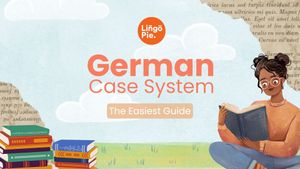Tired of saying just “I love you in German” with a simple Ich liebe dich? Why not take it a step further and spice up your love life with some charming German pet names — or, as they’re called, Kosenamen? Sure, German might not be the first language that comes to mind when you're thinking of sweet, cuddly nicknames. But trust me, this language is packed with surprisingly adorable terms of endearment.
Curious to explore this affectionate side of the German language? Read on to discover over 30 charming German words of endearment. Plus, stick until the very end, where I'll introduce you to an effective tool for mastering these terms and taking your German skills to the next level.
💕 How To Say Thank You In German? 18 Natural Ways
💕 German Curse Words 101 for Total Beginners
💕 6 Common Mistakes In German You Should Not Commit

German Terms Of Endearment
Generally, the German terms of endearment (Koseworte) are affectionate phrases that can be used in various situations, from casual greetings among friends to intimate moments with partners. They're perfect for expressing fondness, showing appreciation, or simply adding a touch of warmth to your everyday conversations.
In this section, we'll cover a wide range of German endearments to suit different relationships and situations:
- Sweet German Terms of Endearment for Boyfriend
- Adorable German Terms of Endearment for Girlfriend
- Cute German Nicknames for Family Members
- German Terms of Endearment for Children
- German Endearments for Friends
- Gender-Neutral Terms of Endearment in German
Whether you're learning German, have German-speaking loved ones, or simply want to expand your vocab knowledge, these expressions will add a delightful touch to your vocabulary.
Sweet German Terms of Endearment for Boyfriend
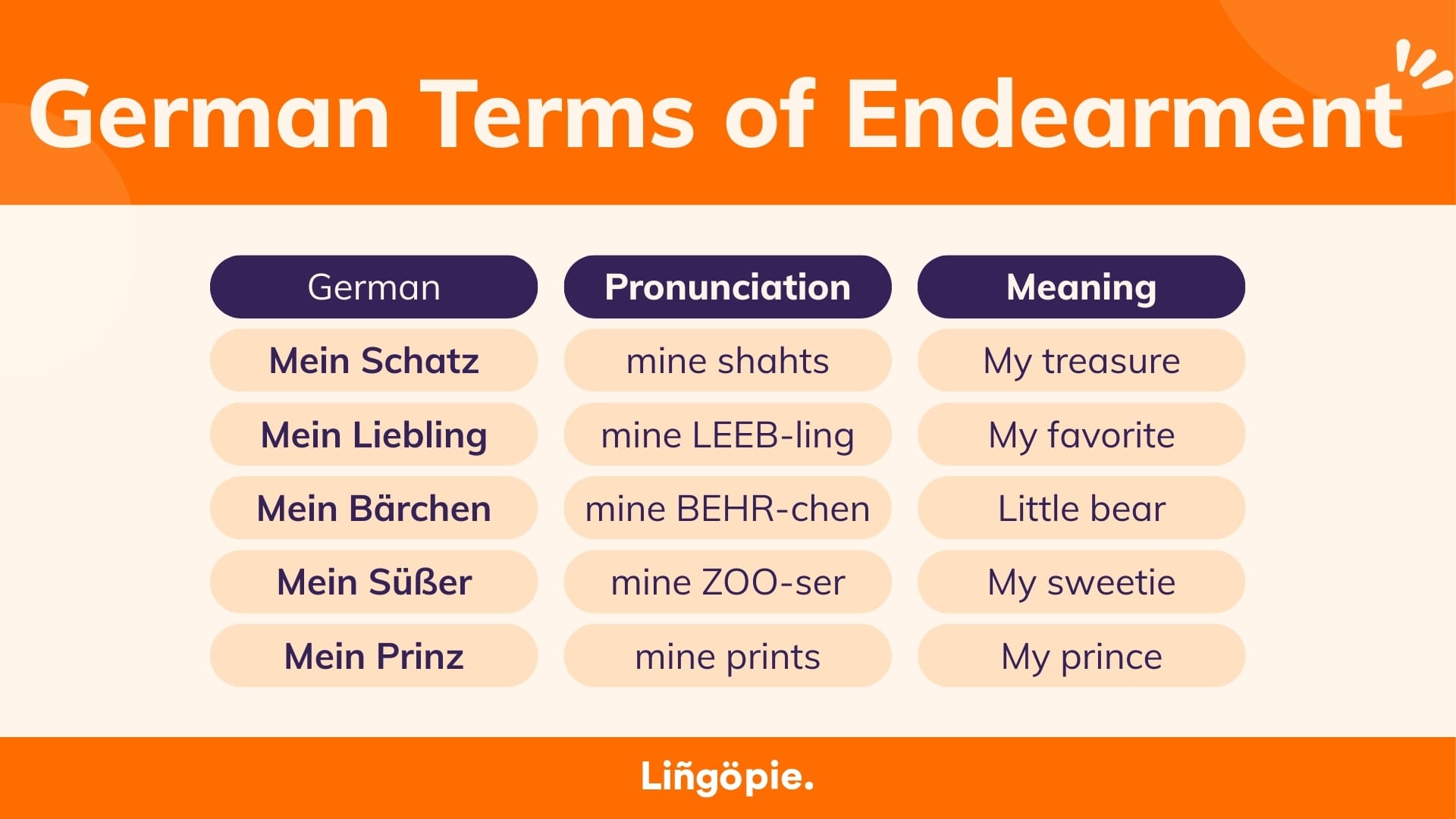
In German-speaking relationships, it's common for women to use affectionate pet names for their boyfriends or male partners. These Kosenamen might sound quirky when translated directly into English, but they're genuinely sweet in German. Some might even seem teasing, but that's often part of their charm!
| German Term | Literal Translation | English Meaning |
|---|---|---|
| Mein Schatz | My treasure | My darling, my sweetheart |
| Mein Liebling | My favorite | My darling, my beloved |
| Mein Bärchen | My little bear | My teddy bear |
| Mein Süßer | My sweet one | My sweetie |
| Mein Prinz | My prince | My prince |
| Mein Kuschelbär | My cuddly bear | My cuddle bear |
| Mein Traummann | My dream man | My dream guy |
| Mein Held | My hero | My hero |
| Mein Großer | My big one | My big guy |
| Schnucki | Cutie (from dialect) | Sweetie, cutie pie |
| Mein Schätzelein | My little treasure | My darling, my sweetie |
| Mein Liebster | My dearest | My dearest one |
| Mein Honey | My honey | My honey |
| Mein Ein und Alles | My one and all | My everything |
| Götterknabe | God-boy | Adonis, dreamboat |
| Mein Löwe | My lion | My strong one |
| Mein Sonnenschein | My sunshine | My sunshine |
| Mein Herz | My heart | My heart |
| Mein Lieber | My dear | My dear |
| Mein Engel | My angel | My angel |
Adorable German Terms of Endearment for Girlfriend
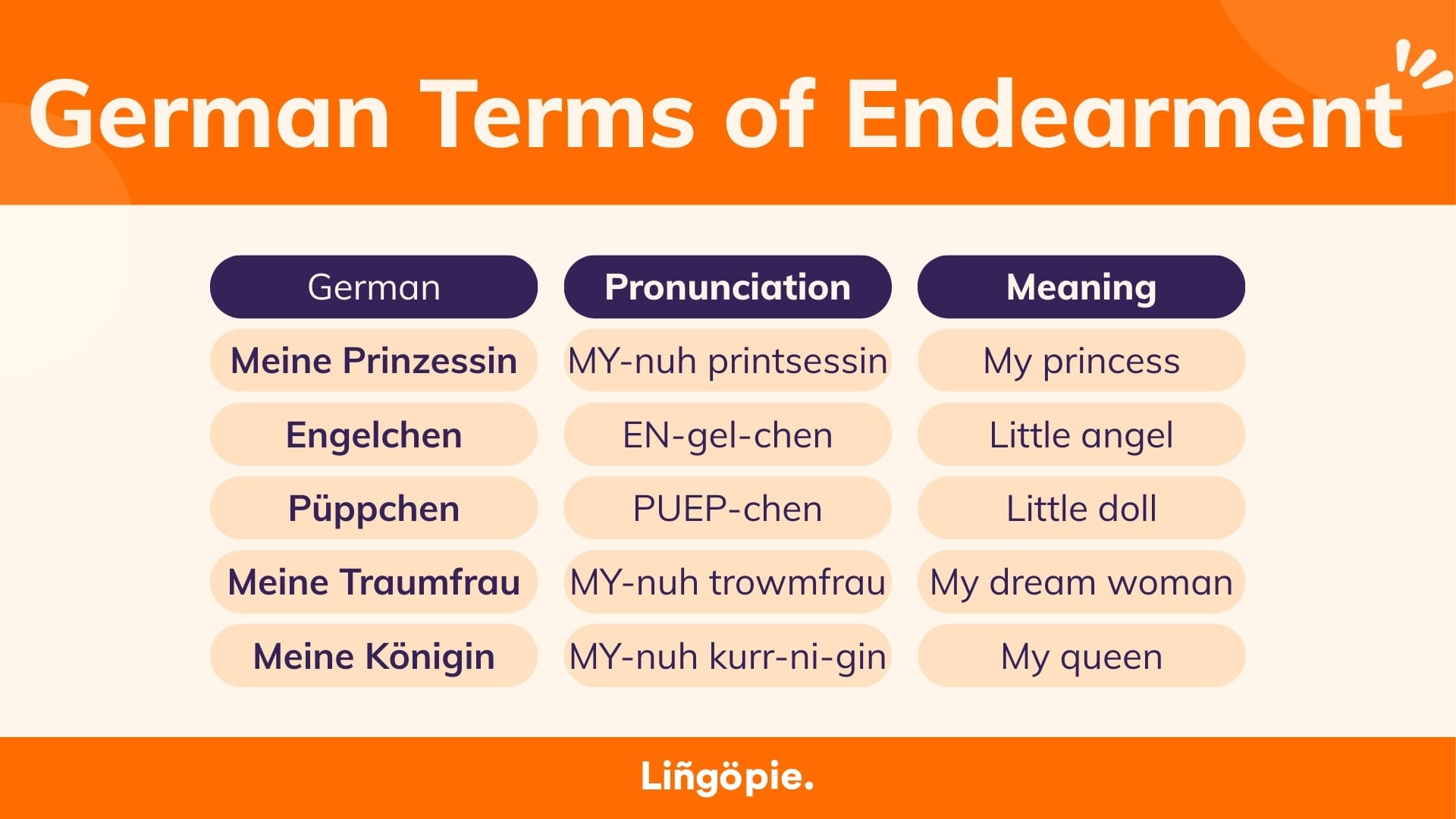
Using these terms can add a touch of romance and playfulness to your relationship, showing your girlfriend just how special she is to you in the German way.
| German Term | Literal Translation | English Meaning |
|---|---|---|
| Meine Schatz | My treasure | My darling, my sweetheart |
| Meine Liebe | My love | My love |
| Meine Süße | My sweet one | My sweetie |
| Mäuschen | Little mouse | Cutie |
| Meine Prinzessin | My princess | My princess |
| Häschen | Little bunny | Bunny |
| Schnecke | Snail | Cutie (despite the literal meaning!) |
| Meine Sonne | My sun | My sunshine |
| Liebling | Favorite | Darling |
| Schätzchen | Little treasure | Sweetie, honey |
| Engelchen | Little angel | Angel |
| Herzchen | Little heart | Sweetheart |
| Püppchen | Little doll | Doll |
| Zuckerpuppe | Sugar doll | Sugar pie |
| Goldfisch | Goldfish | Precious |
| Meine Blume | My flower | My flower |
| Meine Königin | My queen | My queen |
| Meine Kleine | My little one | My little one |
| Meine Traumfrau | My dream woman | My dream girl |
| Honigbiene | Honey bee | Honey |
Cute German Nicknames for Family Members
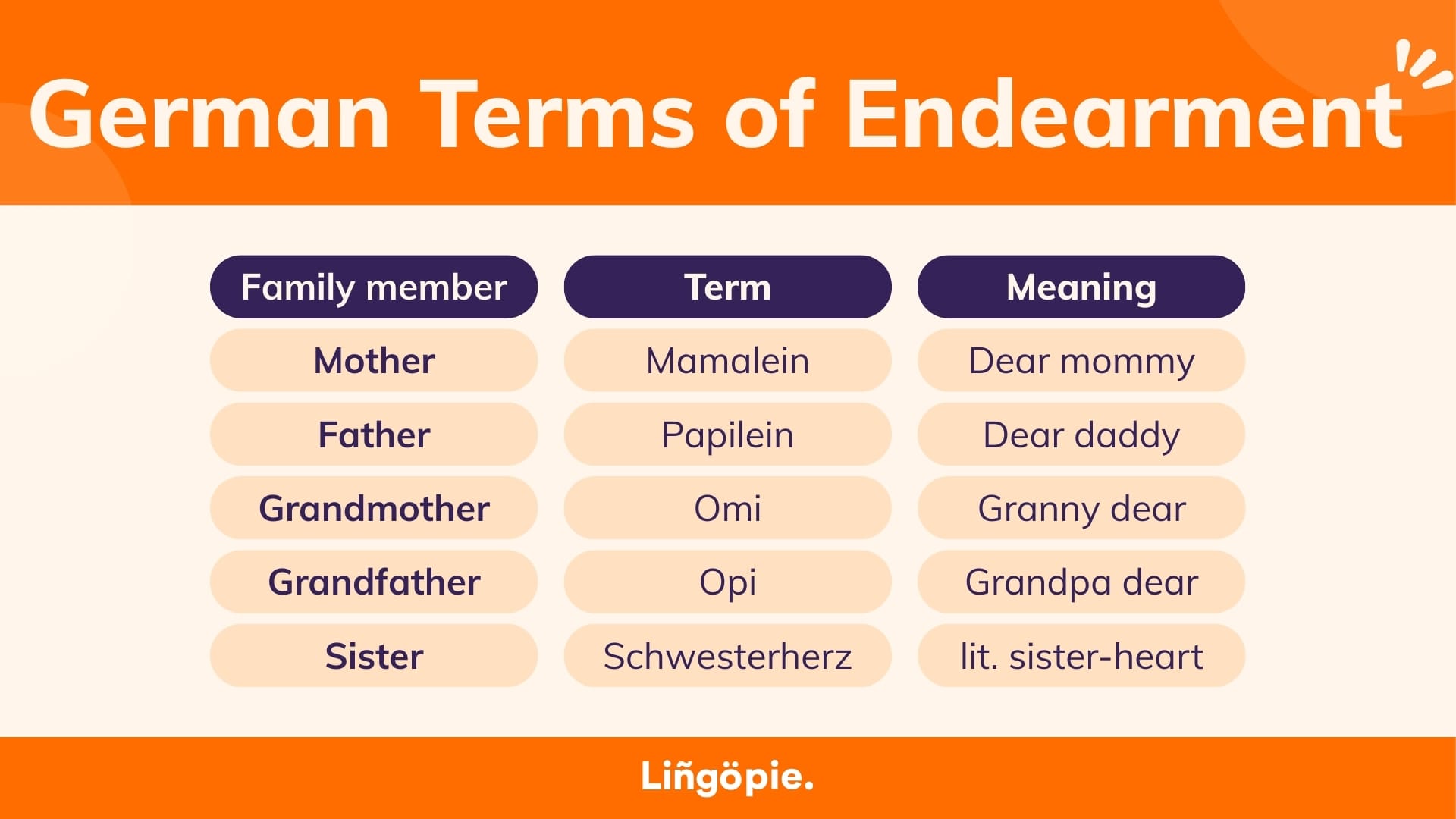
These terms of endearment often reflect the close bonds and warmth within family relationships. From grandparents to siblings, each family member might have a special nickname that's both endearing and respectful.
| Family Member | German Term of Endearment | English Meaning |
|---|---|---|
| Mother | Mäuschen | Little mouse |
| Mother | Mamalein | Dear mommy |
| Father | Papilein | Dear daddy |
| Father | Väterchen | Daddy dear |
| Grandmother | Omi | Granny dear |
| Grandmother | Omilein | Dear little grandma |
| Grandfather | Opi | Grandpa dear |
| Grandfather | Opilein | Dear little grandpa |
| Sister | Schwesterherz | Sister dear (lit. sister-heart) |
| Brother | Bruderherz | Brother dear (lit. brother-heart) |
| Aunt | Tantchen | Auntie dear |
| Uncle | Onkelchen | Uncle dear |
| Daughter | Püppchen | Little doll |
| Son | Bübchen | Little boy |
| Baby | Knöpfchen | Little button |
| Child | Schätzchen | Little treasure |
| Child | Engelchen | Little angel |
| Cousin | Cousinchen | Dear little cousin |
German Terms of Endearment for Children
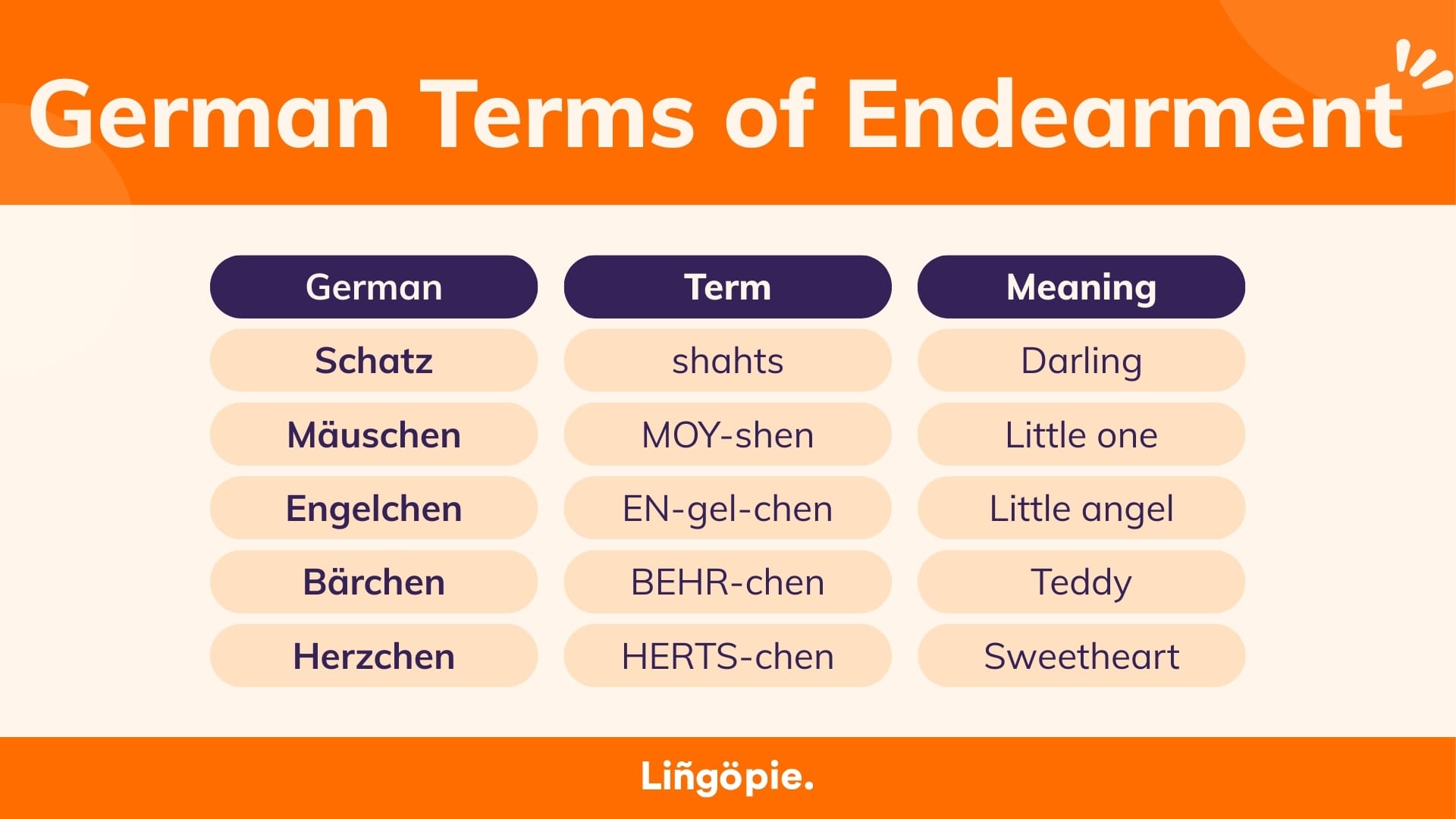
German speakers have a particularly sweet way of addressing children, often using diminutives and animal names to convey tenderness. These terms reflect the special place children hold in German-speaking cultures and the desire to express love and care through language.
| German Term | Literal Translation | English Meaning |
|---|---|---|
| Schatz | Treasure | Darling |
| Mäuschen | Little mouse | Little one |
| Spatz | Sparrow | Sweetie |
| Engelchen | Little angel | Angel |
| Liebling | Favorite | Darling |
| Süßer/Süße | Sweet one | Sweetie |
| Kleiner/Kleine | Little one | Little one |
| Bärchen | Little bear | Teddy |
| Häschen | Little bunny | Bunny |
| Püppchen | Little doll | Doll |
| Schnuckelchen | Cutie (from dialect) | Cutie pie |
| Küken | Chick | Chickadee |
| Knöpfchen | Little button | Button |
| Sonnenschein | Sunshine | Sunshine |
| Honigkuchenpferd | Honey cake horse | Sweet cheeks |
| Herzchen | Little heart | Sweetheart |
| Schneckchen | Little snail | Cutie |
| Mausebär | Mouse-bear | Teddy |
| Zuckerschnute | Sugar snout | Sugar lips |
| Goldfisch | Goldfish | Precious |
German Endearments for Friends
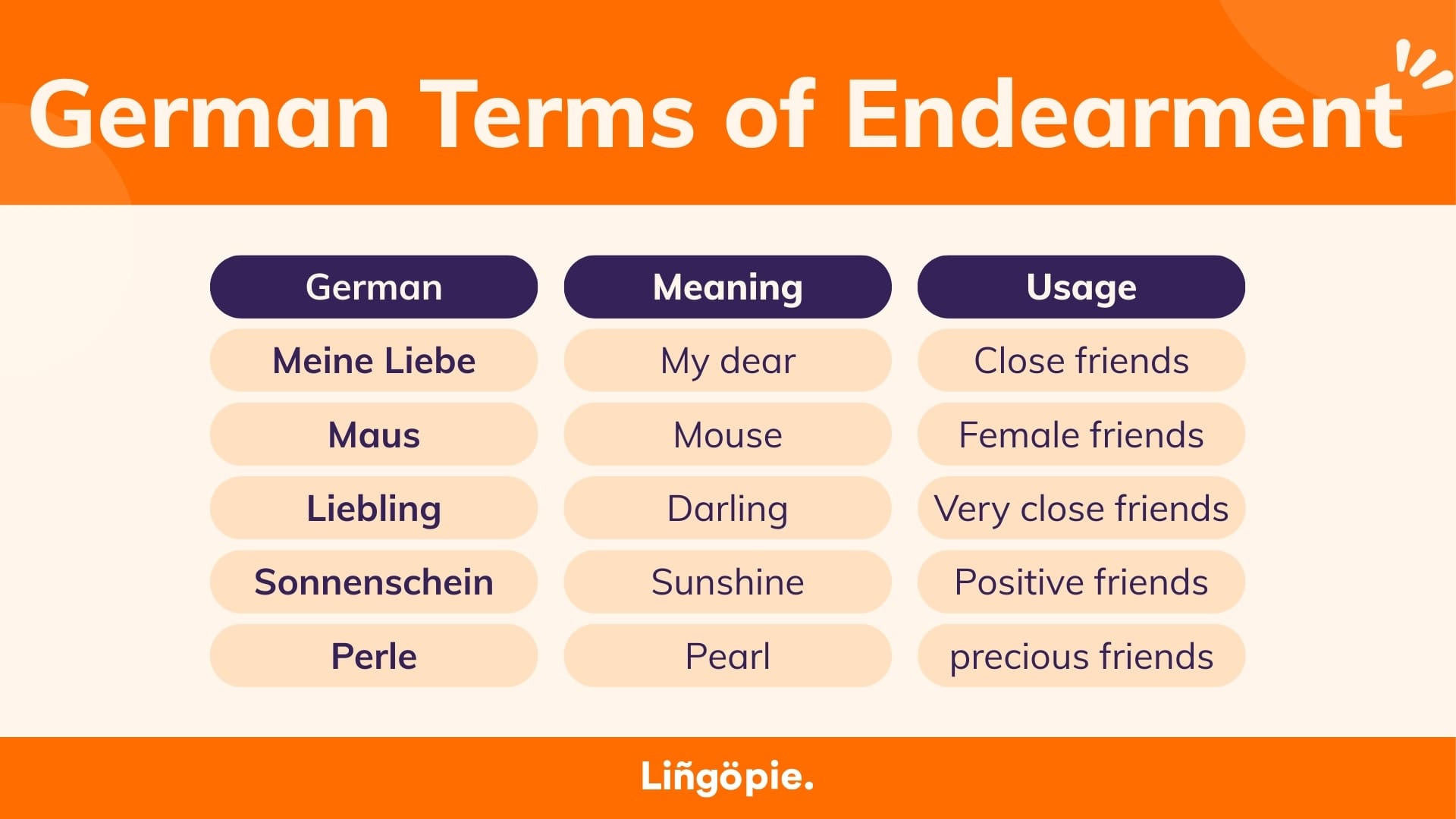
It's important to note that the usage of these terms can vary greatly depending on the region, age group, and individual relationship. Some terms, like "Digga" or "Brudi," are more common among younger people and in certain areas. Others, like "Schatz" or "Liebling," can blur the line between friendship and romantic affection, so context is key.
| German Term | English Meaning | Usage |
|---|---|---|
| Meine Liebe / Mein Lieber | My dear | Affectionate, for close friends |
| Schatz | Treasure | Close friends, warm and affectionate |
| Maus | Mouse | Cute, often used for female friends |
| Süße / Süßer | Sweetie | Affectionate, for close friends |
| Liebling | Darling | Very close friends, quite affectionate |
| Herzchen | Little heart | Warm, for dear friends |
| Mausi | Little mouse | Cute, playful, often for female friends |
| Spatz | Sparrow | Affectionate, cute |
| Schatzi | Little treasure | Playful, for close friends |
| Sonnenschein | Sunshine | Cheerful, for positive friends |
| Bärchen | Little bear | Affectionate, cute |
| Hase / Hasi | Bunny | Playful, for close friends |
| Engel | Angel | For kind, helpful friends |
| Perle | Pearl | For valued, precious friends |
| Goldstück | Piece of gold | For highly valued friends |
Using Diminutives With German Endearments
German speakers have a special trick to make terms of endearment even sweeter: diminutives. These are suffixes that, when added to a word, make it sound smaller, cuter, or more affectionate.
- -chen: The most common, used throughout Germany
- -lein: A softer alternative to -chen
- -i: A casual, playful option
- -le/-li: Common in southern German dialects
Diminutives in German do more than just make words sound cute. When you add -chen or -lein to a noun, it always becomes neuter gender, regardless of its original gender. For example, "die Frau" (the woman, feminine) becomes "das Frauchen" (the little woman, neuter). These suffixes often cause vowel changes in the root word too – 'a' might become 'ä', 'o' to 'ö', and 'u' to 'ü'.
| Original | With Diminutive | Meaning |
|---|---|---|
| Schatz (treasure) | Schätzchen | Little treasure |
| Bär (bear) | Bärchen | Little bear |
| Lieb (dear) | Liebling | Darling |
| Herz (heart) | Herzchen | Little heart |
| Katze (cat) | Kätzchen | Kitten |
Pro Tip: Combine animal names with diminutives for extra cuteness in endearments!
Dating in Germany
Dating in Germany tends to be more reserved and intentional compared to many other cultures. Basically, emotional expression is sincere rather than showy and affectionate. In fact, most of the locals use the expressions below around the 3-to-6-month mark:
- Ich hab’ dich lieb – A softer, more tender version that means “I care deeply for you”
- Ich mag dich – “I like you,” often used at the beginning of a romantic connection
- Du gefällst mir – “I find you attractive” or “I like what I see”
These phrases build emotional intimacy gradually and reflect the value placed on authenticity in German-speaking relationships.
Like elsewhere, many people meet through dating apps such as Tinder, Bumble, and Parship (popular among those seeking long-term relationships). However, the approach on these platforms is often more straightforward. Germans tend to value authenticity in profiles and conversations, and it’s not uncommon for users to prefer direct messages over playful pickup lines.
Who Says “Ich liebe dich” First?
Interestingly, studies show that in heterosexual couples, men in Germany tend to say "Ich liebe dich" earlier — on average, about 108 days into the relationship — while women usually wait a bit longer, around 123 days. Regardless of who says it first, it’s understood to be a meaningful and serious milestone.
What About Public or Casual Use?
While pet names are common in private relationships, they’re less likely to be used publicly or in professional settings. For example, calling a coworker Schätzchen in the office would likely be seen as odd or inappropriate. That said, some nicknames like Liebling or Engel may be used among close friends or family members in more relaxed environments.
5 Best Romantic German Phrases from Movies and TV
After using a term of endearment, German speakers often follow up with romantic phrases to express their feelings more deeply. Here are five of the most common romantic phrases you'll hear in German movies and TV shows:
| German Phrase | Pronunciation | English Translation | Context |
|---|---|---|---|
| Ich liebe dich | Ikh lee-be dikh | I love you | The classic declaration of love |
| Du bist mein Ein und Alles | Doo bist myne ayn oont al-les | You are my everything | Expressing complete devotion |
| Ich kann mir ein Leben ohne dich nicht vorstellen | Ikh kan meer ayn lay-ben oh-ne dikh nikht for-shtel-len | I can't imagine a life without you | Conveying deep commitment |
| Mit dir möchte ich alt werden | Mit deer merkh-te ikh alt vair-den | I want to grow old with you | Expressing desire for a long-term relationship |
| Du bist die Liebe meines Lebens | Doo bist dee lee-be my-nes lay-bens | You are the love of my life | Declaring someone as your soulmate |
If you're interested in hearing these phrases in context and improving your German language skills, try watching German movies and TV shows. Lingopie is an excellent resource for language learners, offering a wide range of German content with interactive subtitles to help you understand and learn as you watch.
💕 5 Best German Short Films For Halloween
💕 25 German Movies And Series To Learn German Fast
💕 10 German Intermediate Movies on Netflix

Melt Hearts In German With Lingopie
Whew! Who knew German could be so darn cute and romantic? From cuddly animal nicknames to heart-melting declarations of love, you're now armed with a toolkit of German affection.
Ready to level up your Deutsche Liebessprache (German love language)? If the answer is yes, then here's a pro tip: dive into some German TV shows or movies. It's like eavesdropping on real German convos, but totally legit! Check out Lingopie – it's packed with cool German content and nifty interactive subtitles.
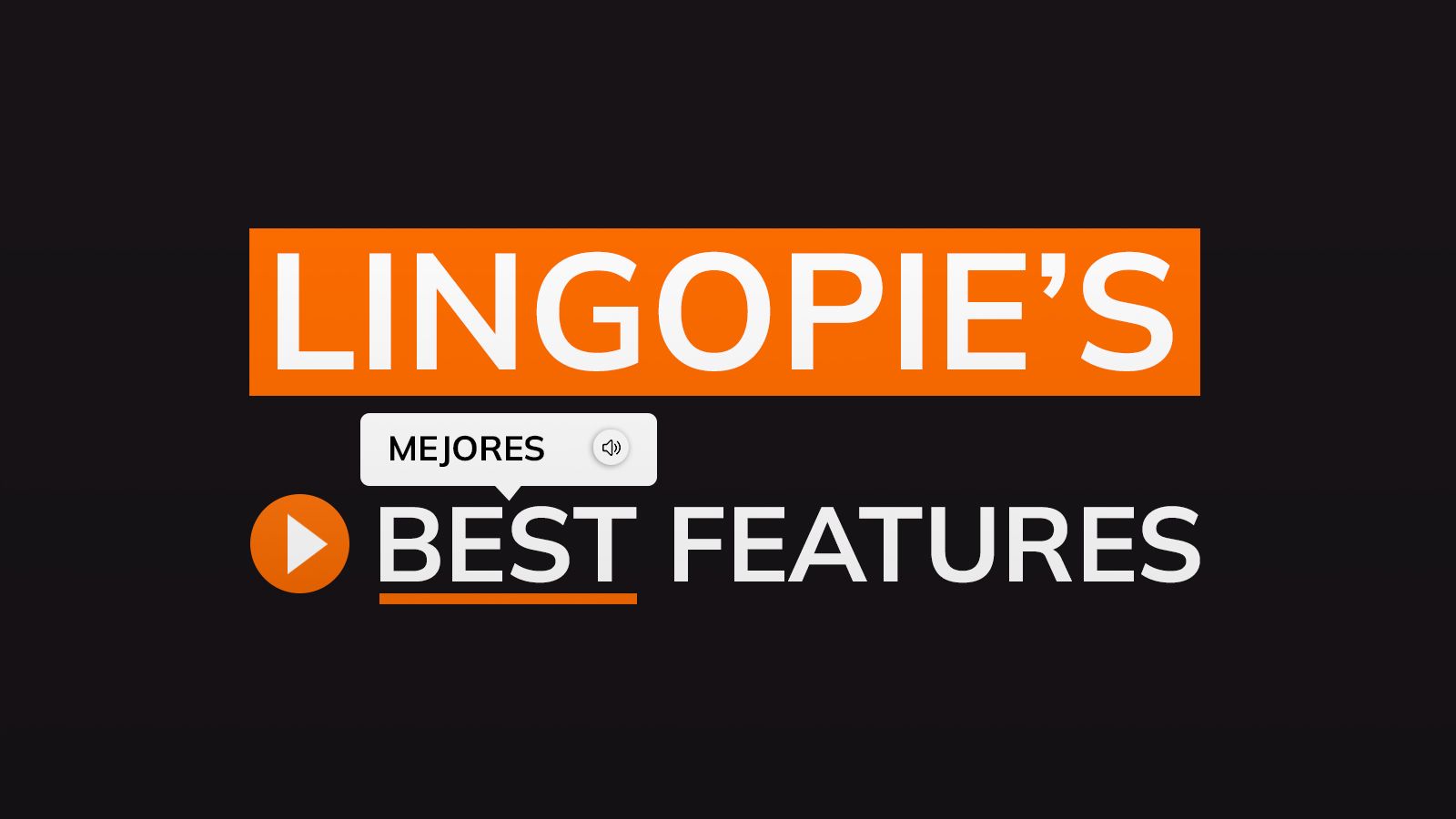
Before you know it, you'll be sweet-talking like a local. Viel Glück und viel Spaß! (Good luck and have fun!)
Frequently Asked Questions About German Terms of Endearment
What is the most common German term of endearment?
The most common German pet name is Schatz, which literally means “treasure.” It is used widely across romantic relationships, close friendships, and even between parents and children. Diminutives like Schatzi or Schätzchen make the term even more affectionate.
Are German pet names only used between couples?
Not at all! While many Kosenamen are romantic, Germans also use terms of endearment for family members, friends, and children. For example, a child might be called Spatz (sparrow), while a sibling might hear Bruderherz (brother heart).
How do you say “sweetheart” or “honey” in German?
In German, “sweetheart” or “honey” is often expressed with words like Schatz, Liebling (darling), Süßer/Süße (sweet one), or Herzchen (little heart). These terms vary in tone from romantic to friendly, and their use depends on the relationship and context.
Can “Schatz” be used for friends or children?
Yes, Schatz is flexible and commonly used beyond romantic settings. German speakers use it affectionately for children, close friends, and even pets. It conveys warmth and closeness without necessarily implying romance.
What does “Liebling” mean in German?
Liebling means “favorite” but functions as “darling” or “dear” in German. It’s often used romantically but is also suitable for expressing affection toward children or close friends. It carries a slightly more poetic or formal tone than Schatz.
What does “Schnucki” mean in German?
Schnucki is an informal, affectionate nickname that roughly translates to “cutie” or “sweetie.” It’s playful, endearing, and often used in close romantic relationships or among people who share a strong emotional bond.
How do diminutives like “-chen” or “-lein” affect endearments?
Adding -chen or -lein to a noun creates a diminutive form, making the term sound smaller, cuter, or more tender. For example, Bär (bear) becomes Bärchen (little bear). These suffixes also change the gender of the word to neuter and often trigger vowel changes in the root word.








![7 Best Apps To Learn German On Your Own [REVIEWED]](/blog/content/images/size/w300/2026/01/best-apps-to-learn-german-on-your-own.png)
![6 Best German Translator Apps For Beginners [TESTED]](/blog/content/images/size/w300/2026/01/Best-german-translation-apps-for-beginners-.jpeg)
